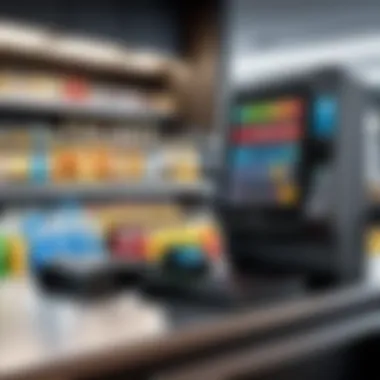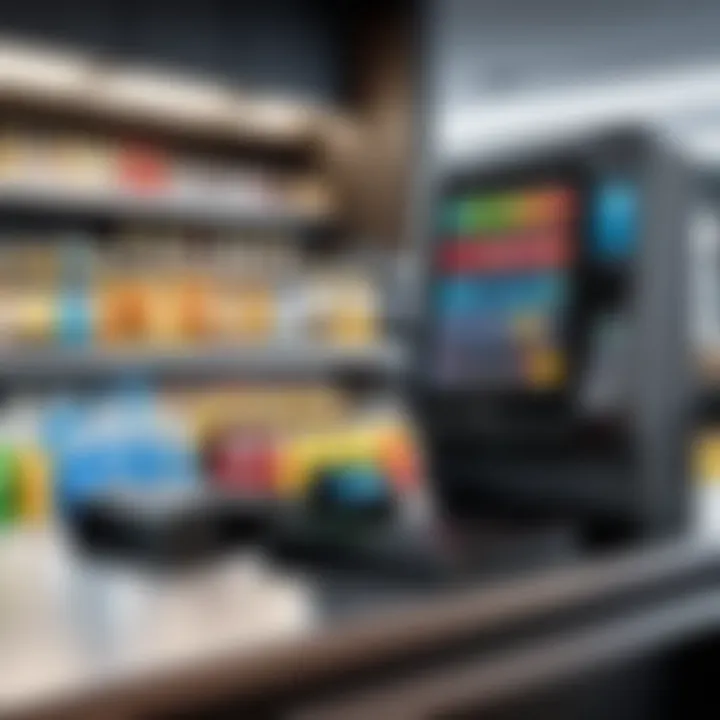Essential Insights on Beverage Management Software


Intro
In today's fast-paced beverage industry, the demand for seamless operations keeps rising. Companies face challenges that require sharp strategies and effective tools to manage their inventory and distribution with an eye toward maximizing efficiency and minimizing waste. As the world becomes increasingly digitized, beverage management software rises to the top as a vital solution. This article takes a closer look at the core features, benefits, and implications of these software systems for businesses within the industry.
Overview of Core Features
With various options available on the market, selecting the right beverage management software can feel daunting. However, understanding its core features lays the groundwork for informed decision-making.
Description of Essential Functionalities
The software typically integrates essential functionalities that streamline operations, including:
- Inventory Tracking: A real-time system helps businesses manage stock levels effectively, reducing the risk of overstocking or stockouts.
- Ordering Automation: Automated ordering tools can prompt stock reorders based on inventory thresholds, simplifying the procurement process significantly.
- Sales Analytics: Utilizing embedded reporting and analytical tools, businesses can assess sales trends, allowing them to make data-driven decisions about product lines or promotions.
- Supplier Management: Keeping tabs on supplier performance and lead times can optimize purchasing decisions, helping to maintain needed stock levels without excess.
- Compliance Management: In this highly regulated industry, software often includes features to help companies comply with legal obligations surrounding pricing and labeling.
These functionalities contribute not only to efficiency but also to cost savings and enhanced reporting capabilities, which can drive strategic initiatives.
Comparison of Features Across Top Software Options
Different software variants may offer distinct features tailored to diverse needs. For instance, consider:
- Toast: Known for its comprehensive and user-friendly interface, it excels in inventory management and analytics.
- NetSuite: Offers deep integration capabilities across various departments, making it ideal for larger organizations.
- Orca: Targets small businesses with its simplified features while still providing solid inventory tracking and ordering automation.
It's crucial that businesses evaluate these features in alignment with their specific requirements before committing to an option.
User Experience and Interface
Software with a friendly user interface (UI) doesn’t just look good; it enhances usability, which is paramount for teams functioning under pressure.
Insights Into UI/UX Design Aspects
A clean, intuitive design can significantly influence how effectively a team interacts with the software. Look for some key aspects:
- Dashboard Customization: Users should have the ability to configure their interfaces to prioritize the information most relevant to them.
- Mobile Compatibility: Given the on-the-go nature of the beverage industry, mobile access to software features is increasingly critical.
- Training Materials: Well-structured guides or tutorials assist users in utilizing the software to its full potential, facilitating smoother onboarding.
Importance of Usability and Accessibility
Usability drives adoption and ultimately affects the return on investment. The more accessible the software is for different roles within a business—from managers to warehouse staff—the better the overall effectiveness. Features designed with an eye toward accessibility ensure that a varied workforce can partake and utilize the tools competently.
"The right beverage management software can significantly enhance operational efficiency and make data-driven decisions that shape the future of your beverage business."
As the article unfolds, we will examine how these features coalesce to create value within companies, alongside the evolving trends that will shape the future of the industry.
Understanding Beverage Management Software
In a landscape where the beverage industry is increasingly competitive, knowledge of how to efficiently manage resources becomes paramount. Beverage management software is emerging as a vital tool, empowering businesses to optimize their operations. The relevance of this topic can't be overstated, as the right software can significantly streamline processes, enhancing both productivity and profitability. Decisions made regarding software implementation not only affect inventory management but also have wider implications for customer satisfaction and operational planning.
Definition and Purpose
Beverage management software serves a specific, important purpose: it coordinates all aspects of beverage operations—from tracking stock levels to analyzing sales trends. This software is designed to make the task of managing beverages less cumbersome and more efficient, essentially acting as a central nervous system for any beverage-centric business. It can help prevent stockouts, reduce waste, and improve overall service quality.
The goal is simple yet critical: create a more transparent and responsive operation while knee-deep in the hustle and bustle of daily activities.
Key Components of Beverage Management Software
Inventory Tracking
Inventory tracking is one of the backbone functionalities of any beverage management software. It allows businesses to keep a real-time pulse on their stock, ensuring that every bottle, can, or keg is accounted for. A key characteristic of effective inventory tracking is its ability to provide detailed reports on usage trends and stock levels.
This makes for a savvy choice since knowing what’s selling, and what’s just gathering dust, directly impacts profitability. Take for instance a bar that uses inventory tracking to notice that a particular cocktail mixer hardly moves off the shelf. The manager can then decide if it's time to query the supplier for a special deal or to consider replacing that mixer altogether.
Sales Analytics
Moving onto sales analytics, this component plays a crucial role in deciphering customer behavior and preferences. It dives deep into sales data, providing insights that can assist in creating tailored marketing strategies. Understanding peak sales times or identifying best-sellers helps businesses in crafting their offerings. One unique feature of sales analytics is predictive analytics which can be used to forecast future sales trends based on historical data.
While it sounds promising, this aspect is reliant on the accuracy and completeness of the entered data. If data entry is sloppy, predictive analytics will be of no real help.
Order Management
Order management is the lifeblood of beverage procurement. This aspect helps businesses handle the entire order process efficiently—from initial setup to the final delivery. It’s a beneficial choice as it minimizes errors while improving the speed at which orders are placed and processed.
A unique feature herein could be automated ordering. Imagine a situation where stock precisely hits a pre-determined threshold, and an order is automatically triggered! However, one must be cautious: over-reliance on automation can lead to complacency in understanding stock needs.
Supplier Management


Never underestimate the role of supplier management. This function facilitates smooth relationships between businesses and suppliers. It includes tracking supplier performance, managing contracts, and ensuring timely deliveries. A key characteristic is the database of suppliers which can serve as a reference point for negotiations.
With the right tool, a business can quickly evaluate which suppliers consistently deliver quality and which ones fall short. However, depending too heavily on a limited pool of suppliers may lead to vulnerabilities in the long run.
In summary, beverage management software encompasses several key components that work synergistically to enhance overall operational efficiency. From inventory tracking to supplier management, each piece plays its role in a larger puzzle that, when assembled correctly, leads to reduced costs, increased sales, and satisfied customers.
Benefits of Implementing Beverage Management Software
Beverage management software plays a vital role in modernizing operations within the beverage industry. It’s not just a shiny piece of tech; it’s a game-changer that can streamline processes and improve efficiency in ways that were hard to imagine a decade ago. Organizations are increasingly realizing that adopting such software translates into tangible benefits that can enhance their bottom line. Here are some pivotal advantages that come with the implementation of beverage management software:
Increased Operational Efficiency
Operational efficiency often hinges on the ability to manage resources effectively. Beverage management software grants companies the ability to automate many routine tasks, freeing up staff to focus on higher-value activities. For instance, consider a busy bar during peak hours. With automated inventory tracking, employees spend less time counting bottles and more time serving customers. This can lead to quicker service times and reduced wait periods, ultimately boosting sales.
Furthermore, the software can streamline order management processes. When a bar runs low on stock, the system can automatically generate purchase orders based on pre-set thresholds. This means there is less chance of running out of popular items and more opportunity for consistent revenue. Automating these tasks not only optimizes time but also cuts down on human error, which can often lead to costly mistakes.
Enhanced Data-Driven Decision Making
In today’s business landscape, data is king. Beverage management software allows organizations to collect and analyze extensive sales data and inventory levels. By tapping into this wealth of information, decision-makers can pinpoint trends that might go unnoticed otherwise. For example, if the data reveals that a specific cocktail is overwhelmingly popular on Fridays, managers can ensure they are adequately stocked with the necessary ingredients.
Moreover, the software can provide insightful reports that highlight sales patterns based on time of day, seasonality, or even customer demographic trends. Having access to such in-depth analytics can inform promotional strategies and pricing decisions. This leads to a more agile operation that can respond swiftly to market changes and customer preferences, ultimately enhancing profitability.
"Data-driven decisions are not just about numbers, but about understanding the story behind them."
Improved Customer Satisfaction
The customer experience is often what sets one business apart from another. Implementing beverage management software improves customer satisfaction by enabling establishments to offer quicker service and higher-quality products consistently. When bartenders and servers can access real-time data on inventory and popular menu items, they can make better recommendations and ensure they always have favorites in stock.
Additionally, features such as electronic menus and customer feedback tools can further enrich this experience. Customers appreciate transparency and quick transactions. When they can place an order electronically, knowing their drink is being prepared as they reach the bar, it creates a seamless interaction that customers are likely to remember—and return for.
Integrating these systems can bring long-lasting benefits that translate into increased revenue and a stronger brand reputation.
Selecting the Right Beverage Management Software
Selecting the appropriate beverage management software can make or break a business, particularly in a competitive industry where every drop counts. Businesses need to consider their specific requirements, user experience desires, and budget constraints before making a decision. This section takes a close look at the key factors to consider when choosing the right software solution that aligns with operational goals. By carefully analyzing these elements, companies can ensure they select a system that not only meets their current needs but also positions them for future growth.
Identifying Business Needs
Before diving into the selection process, it’s crucial to identify the unique needs of the business. Different companies operate on various scales, offer diverse products, and have distinct budgeting priorities.
Size of Operation
One significant aspect of selecting beverage management software is the size of operation. This involves recognizing whether you are running a small cocktail bar or a large multi-location chain. The software's capacity to handle this scale is essential. Larger operations may require solutions that can manage complex logistics and extensive inventories, while a smaller establishment might benefit from simpler, more cost-effective tools.
The unique feature here is scalability. A software that easily adapts to growing operational demands offers clear advantages. However, investing in a solution too complex for a smaller setup can lead to wasted resources and frustration.
Type of Beverage Offered
Next comes the type of beverage offered. Establishments differing in beverage styles—from craft breweries to upscale wine bars—require distinct functionalities in their management software. Each type can demand specific tracking features, regulatory compliance tools, and customer engagement capabilities.
For instance, a brewery may need robust reporting capabilities for production and distribution, while a café focusing on specialty coffees may prioritize user-friendly inventory tools. The adaptability of the software can be its strong suit, catering to diverse beverage types. However, a narrow solution might limit growth potential.
Budget Considerations
Finally, budget considerations cannot be overlooked. An organization must align its financial means with the software's cost, which may vary widely. It's crucial to balance between feature sets and pricing. A rich functionality suite might seem appealing but could pose a burden on smaller budgets.
Many modern systems offer tiered pricing based on features or the number of users, giving flexibility. However, choosing a cheaper yet insufficient solution can lead to operational setbacks. It’s advisable to assess total cost over time which includes hidden fees for updates or support.
Evaluation Criteria
After identifying business needs, evaluating candidates effectively becomes paramount. Various criteria can gauge whether a software choice aligns with operational objectives.
Functionality
Functionality directly correlates to how well a software can address operational challenges. Depending on specific tasks—be it inventory management, sales tracking, or supplier logistics—companies should prioritize software that excels in those functionalities. Effective functionality can mean the difference between seamless operations and chaotic keg counts.
However, overly complex systems with too many features can confuse users, hampering productivity. So it's essential for users to find a balance between capability and usability.


User Experience
Since software is a tool for employees, user experience is a major part of the selection. Intuitive interfaces facilitate quicker adaptation, minimizing disruptions during onboarding. A pleasant user experience encourages staff to engage with the software regularly, thus maximizing its potential.
Complexity can stall the learning curve, potentially turning off users. This feedback loop of usability impacts overall satisfaction and efficiency, making it an important criterion to consider.
Integration Capabilities
Having powerful integration capabilities means ensuring that the beverage management software can work well with existing systems. This could involve POS systems, financial software, or supply chain solutions. If the new software can't seamlessly connect with these tools, it can lead to unnecessary manual work and potential errors.
The real advantage of good integration lies in data consistency and accuracy across platforms. However, some software may promise rich integrations but fall short in execution, thus necessitating careful assessment during the evaluation phase.
Vendor Comparison and Reviews
Once potential software options are available, conducting a thorough vendor comparison and reviews becomes essential. This can include reading user testimonials, comparing pricing models, and analyzing feature sets.
Real-world experiences shared on platforms such as facebook.com or reddit.com can bring insights into functionality and support responsiveness, infusing real value to decision-making processes. Remember, the right software is not just about slick marketing; it's about finding a partner that can grow along with the business.
It is important to thoroughly assess both available features and user feedback when navigating the selection of beverage management software. The right match can streamline operations and lead to significant efficiencies.
Implementing Beverage Management Software
Implementing beverage management software is a significant endeavor for any business in the beverage industry. This move goes beyond merely introducing new technology; it fundamentally reshapes how operations are run and how data is utilized. Proper implementation can lead to substantial benefits, such as enhanced efficiencies, reduced costs, and improved accuracy in managing inventory. However, to achieve these goals, it’s essential to focus on several specific elements, including training staff and change management strategies.
Training and Onboarding
Staff Training Programs
Staff training programs are a cornerstone of successfully integrating beverage management software into operations. The primary contribution of these training initiatives is improving staff competence and confidence when using the software. Key characteristics include thoroughness, competency-based assessments, and adaptability to different learning styles. For instance, programs may combine online modules with hands-on practice, allowing employees to interact directly with the system.
A unique feature of effective staff training programs is their role in fostering a culture of continuous learning. By emphasizing ongoing education about new features and updates, organizations not only enhance staff skill sets but also promote a culture of adaptability. This approach is beneficial because it ensures that the team remains engaged and informed, allowing them to leverage the software's full potential. However, if the training is inadequate or rushed, it can lead to misunderstandings, which ultimately could harm operational efficiency.
"A well-trained staff can turn challenges into opportunities, tapping into the software's capabilities to streamline operations."
Ongoing Support
Ongoing support is equally crucial in the journey of implementing beverage management software. It plays a vital role in ensuring that the transition remains smooth, even after the initial onboarding phase. The main characteristic of ongoing support is its accessibility, which may include resources like helplines, dedicated account managers, and online knowledge bases. This constant availability can alleviate frustrations during troubleshooting and help users feel more assured as they adapt to new practices.
One standout element of ongoing support is the incorporation of regular feedback loops. Periodic check-ins can be established to gather users' input on the software's performance and any emerging challenges. This feedback can be invaluable for vendors looking to improve their offerings. While ongoing support has the advantage of keeping teams confident, it's also worth noting that if organizations neglect this phase, they risk a drop in user engagement and can inadvertently set the stage for misuse or complete disengagement with the software.
Change Management Strategies
Change management strategies are critical when introducing beverage management software. These strategies help alleviate the discomfort often associated with adopting new systems. Focusing on clear communication throughout the transition period is essential. Stakeholders should outline the benefits the software will bring to the team and the organization as a whole.
Implementing a phased approach allows users to gradually adjust to the new system rather than being overwhelmed all at once. Involving team members in the planning process can also yield dividends; users often feel more invested when they've had a hand in determining how changes will be rolled out. The drawback lies in the potential for resistance; a poorly managed transition can lead to reluctance among staff.
Real-World Applications of Beverage Management Software
Beverage management software stands as a powerhouse for various segments within the beverage industry. Its real-world applications stretch across different sectors, where efficiency and accuracy are paramount to success. By employing such software, businesses can streamline their operations, providing a practical route to overcoming numerous challenges associated with beverage supply chain management. The importance of this topic lies in demonstrating how various organizations can harness technology to create a competitive advantage while enhancing customer satisfaction.
In today’s fiercely competitive market, effectively managing beverage inventories, sales, and procurement is not just helpful; it's essential. Companies utilizing this software gain a robust framework to navigate the complexities involved in their line of work. From restaurants to breweries, the spectrum of real-world applications showcases diverse use cases that reflect the software's adaptability and effectiveness. This section sheds light on specific instances where beverage management software has made a notable impact, illustrating its true value.
Case Study: Restaurant Management
Restaurants face a myriad of challenges when it comes to beverage management. With fluctuating customer demands and diverse menus, maintaining a flawless inventory system can seem daunting. Here, beverage management software becomes a game-changer. For instance, a mid-sized restaurant in a bustling city decided to implement a dedicated beverage management system to handle its beverage inventory and sales tracking.
This specific software allowed the restaurant to automate its ordering process with suppliers, ensuring they had enough stock without over-purchasing. Staff could also monitor sales patterns—knowing when to push certain drinks based on seasonality or customer preferences. As a result, their beverage cost was reduced by nearly 15% within the first year of implementation. Achieving accuracy in orders led to less waste and higher profit margins. The ability to analyze data on beverage performance further enabled the management to make informed decisions about pricing strategies and promotions.
Case Study: Brewery Operations
Brewery operations present unique demands regarding beverage management due to the complexity of brewing and distribution. A well-known craft brewery opted for beverage management software that catered specifically to its operational requirements. The software it chose integrated seamlessly with its existing systems, enabling comprehensive tracking from fermentation to final distribution.
With this software in place, the brewery could forecast demand more accurately. It tracked production or distribution schedules, ensuring they align perfectly with sales forecasts. The use of predictive analytics also allowed the brewery to experiment with new recipes while carefully monitoring the impact on inventory and production timelines. This multi-faceted approach resulted in a 20% increase in overall efficiency and a quicker turnover time for popular brews. Recognizing trends and adjusting operations accordingly helped foster a loyal customer base and enhance overall operational performance.
The insights from these case studies underscore the practical applications of beverage management software. Whether through heightened efficiency in restaurants or adaptive management practices in breweries, the potential for improved performance is clear. As businesses grow more complex, leveraging technology to manage the intricacies of beverage supply will continue to be of paramount importance.


Future Trends in Beverage Management Software
Understanding Future Trends in Beverage Management Software is essential, as these developments shape how businesses adapt and thrive in a competitive landscape. Emerging technologies and shifting consumer preferences are driving the evolution of this software, presenting unique opportunities for optimization and growth. The exploration of these trends is not just an academic exercise but a necessity for stakeholders aiming to stay ahead in the beverage industry.
Integration with Emerging Technologies
Artificial Intelligence
Artificial Intelligence (AI) has taken the spotlight in various industries, and beverage management is no exception. It's being leveraged to analyze vast data sets, ensuring decision-makers feel like they have a crystal ball. By efficiently predicting demand trends, AI can assist managers in optimizing inventory levels.
One of the key characteristics of AI is its ability to learn from historical data, allowing it to provide accurate forecasts and recommendations. This adaptability makes it a popular choice in today's fast-paced market. A standout unique feature of AI in beverage management is its application in customer engagement, choosing recommendations based on analyzing consumer preferences. The advantages are clear - with AI, businesses can anticipate needs and adjust quickly, improving customer satisfaction and minimizing waste. However, it's not all rainbows and butterflies; there can be disadvantages such as hefty upfront costs and a reliance on accurate historical data.
Blockchain Solutions
Blockchain technology has emerged as a game-changer by addressing transparency and traceability issues. In a world where consumers increasingly demand to know the source of their products, blockchain provides an excellent solution. This technology ensures that every transaction is recorded and immutable, making it easier for businesses to manage their supply chains.
A significant characteristic of blockchain is its decentralized nature, allowing for distributed ledger technology that enhances trust among users. For beverage management businesses, this means that every step of the product’s journey can be traced back to its origin, ensuring authenticity and safety.
The unique feature of blockchain is its potential for ensuring regulatory compliance by providing transparent records of production and distribution processes. The advantages include enhanced consumer trust and an improved reputation for brands that embrace this technology. Yet, companies face disadvantages, such as the complexity of implementation and the need for proper training, which can slow the transition to effective use.
Growing Demand for Mobile Solutions
As the world becomes more interconnected through smartphones and tablets, the demand for mobile solutions in beverage management is on the rise. Mobility allows decision-makers to access critical information on the road, ensuring that they can adjust operations in real-time when necessary.
Mobile solutions often come with user-friendly interfaces that allow for quick transactions and updates on inventories. With the growing emphasis on data accessibility, businesses that invest in mobile-capable beverage management software enable teams to make informed choices on the fly, enhancing agility and responsiveness. This demand reflects a shift towards a more dynamic work environment, where quick decisions can set businesses apart.
In summary, keeping an eye on these future trends in beverage management software can help decision-makers navigate a rapidly changing landscape. From artificial intelligence and blockchain solutions to the growing need for mobile capabilities, staying informed is crucial for enhancing operations and ensuring long-term success.
Challenges in Beverage Management Software Adoption
Adopting beverage management software brings a host of challenges that can make or break the decision to implement such systems in an organization. The ability to manage inventory effectively, analyze sales data, and streamline operations is enticing. However, the obstacles that accompany these transitions merit careful consideration. Understanding these challenges is crucial for stakeholders to strategize around potential pitfalls and ensure a smooth transition. It’s where foresight meets action, ultimately determining how well an organization adapts to and benefits from this technology.
Technical Barriers
When integrating new technology into any existing infrastructure, technical barriers often pose significant hurdles. Beverage management software can be laden with complexities, which may vary greatly from one solution to another. One might expect issues like inadequate compatibility with current systems to arise. For instance, a small coffee shop that operates on an older POS system might find it incredibly challenging to integrate a comprehensive beverage management platform smoothly.
Also, the level of technical knowledge among staff can greatly influence the success of such implementations. If an organization lacks personnel skilled in IT, they may find themselves scrambling when technical issues arise or when system upgrades are necessary.
- Integration Challenges: Mismatches between software and hardware can cause major headaches.
- Maintenance Requirements: Ongoing updates and troubleshooting can drain resources.
- Data Migration Issues: Moving historical data into a new system without errors can be a daunting task.
Prior planning can mitigate some of these risks. Organizations should consider conducting thorough technical assessments before selecting software to better understand compatibility requirements and potential integration challenges.
Resistance to Change
Getting people on board with new technology isn't a walk in the park. Resistance to change is a natural response, particularly in environments where employees have become accustomed to a certain workflow or system. For many workers in the beverage industry, sticking to the familiar is more comfortable than embracing the unknown.
It is often said, “If it ain’t broke, don’t fix it.” This adage encapsulates the mindset many exhibit when confronting change. Employees may fear that new software could complicate their roles or even threaten their jobs. Thus, fostering an environment of trust and transparency is essential.
- Training Gaps: If staff isn’t adequately trained, anxiety about the new system can escalate.
- Cultural Barriers: Traditional business cultures may stifle innovation, leading to reluctance.
- Job Security Concerns: Employees might worry that increased automation could render their positions obsolete.
Establishing the right change management strategies can make a world of difference. Engaging staff in the decision-making process, addressing their concerns, and clearly communicating the benefits of the software can aid in easing this transition.
"The best way to predict the future is to create it." - Peter Drucker
Successfully navigating these challenges isn’t merely about overcoming obstacles; it’s about building a culture ready to embrace modern solutions that can redefine business operations for the better.
The End: The Role of Beverage Management Software in Industry Success
As the beverage industry continues to evolve, the role of beverage management software has never been more pivotal. It serves as a cornerstone that helps businesses navigate the complexities of inventory control, sales tracking, and supplier management, ultimately driving both operational efficiency and profitability. By leveraging these software solutions, companies can make decisions that aren't just based on gut feelings but rather on solid data and analytics.
Summarizing Key Insights
In this exploration, several key insights have emerged that highlight the critical importance of beverage management software in achieving success within the industry. Below are some key takeaways:
- Operational Efficiency: The software automates numerous tasks, drastically reducing the time staff spend on manual processes. This allows teams to focus on enhancing customer experiences and improving sales strategies.
- Data-Driven Decision Making: By providing valuable analytics, beverage management systems allow decision-makers to spot trends, adjust pricing strategies, and forecast future demands—key elements for sustaining competitive advantage.
- Supplier Relationships: With better management of supplier interactions, companies can negotiate better terms and maintain consistent quality, all while optimizing their supply chain.
"In today's fast-paced market, the companies that adapt quickly through technology, such as beverage management software, are the ones that thrive."
- Customization and Scalability: Many modern systems are designed to be flexible, adapting to the unique needs of different businesses—whether a small local brewery or a large-scale distributor.
In light of all these elements, it becomes clear that beverage management software is not merely a tool but an essential partner in achieving sustained success. Investing in the right software today can mean the difference between flourishing in this competitive landscape or simply surviving the next wave of changes that come our way.



